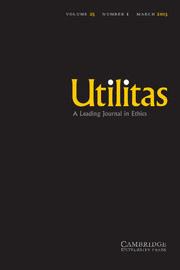
Utilitas
Scope & Guideline
Advancing critical thought in utilitarian ethics.
Introduction
Aims and Scopes
- Ethical Theories and Moral Philosophy:
The journal explores various ethical frameworks, including utilitarianism, deontology, and virtue ethics, providing a rich discourse on their implications for moral decision-making. - Social Justice and Equality:
Utilitas emphasizes discussions surrounding social justice, inequality, and the moral responsibilities individuals and societies hold towards one another, particularly in relation to economic and environmental issues. - Interdisciplinary Approaches to Ethics:
The journal encourages interdisciplinary research that incorporates insights from political philosophy, economics, and social sciences, fostering a comprehensive understanding of ethical issues. - Historical Contextualization of Moral Issues:
Utilitas frequently revisits historical philosophical texts and figures, such as John Stuart Mill and Jeremy Bentham, to draw connections between past and present ethical dilemmas. - Applied Ethics:
The journal publishes works that apply ethical theories to real-world issues, including bioethics, animal ethics, and environmental ethics, making philosophical discussions relevant and actionable.
Trending and Emerging
- Moral Uncertainty and Decision-Making:
Recent publications emphasize the complexities of moral uncertainty, reflecting a growing interest in how individuals navigate ethical dilemmas when faced with ambiguous situations. - Intergenerational Justice:
There is an increasing focus on intergenerational justice, highlighting moral responsibilities towards future generations, particularly in discussions of climate change and resource allocation. - Animal Ethics and Welfare:
The journal is witnessing a rise in discussions surrounding animal ethics, particularly concerning wild animal suffering and the moral implications of intervention in nature. - Health and Well-Being Ethics:
Emerging themes related to health, well-being, and the ethics of paternalism indicate a trend towards examining how ethical frameworks can guide public health and individual health decisions. - Social and Economic Justice:
Recent articles illustrate a renewed focus on the intersections of ethics with social and economic justice, particularly in the context of inequality and economic growth debates.
Declining or Waning
- Traditional Egoism:
Discussions centered on egoism as a moral framework have decreased, possibly indicating a shift towards more collective and altruistic ethical theories that prioritize social welfare. - Overly Abstract Theoretical Constructs:
There seems to be a declining interest in highly abstract philosophical constructs that lack practical implications, as the journal increasingly favors applied ethics and real-world relevance. - Narrow Utilitarian Perspectives:
The journal has moved away from narrow interpretations of utilitarianism, focusing instead on broader ethical discussions that encompass a variety of moral theories and approaches. - Historical Philosophical Figures in Isolation:
While historical figures such as Mill and Bentham are still discussed, their analysis is now often contextualized within contemporary debates rather than treated as standalone authorities. - Purely Theoretical Debates on Consequentialism:
There is a noticeable reduction in articles that engage in purely theoretical debates about consequentialism without applying these discussions to current moral dilemmas.
Similar Journals

Ethics & Bioethics
Fostering dialogue on contemporary ethical dilemmas.Ethics & Bioethics is a vital interdisciplinary journal published by DE GRUYTER POLAND SP Z O O, focusing on the ethical dimensions of biological and medical practices. Since its transition to an Open Access model in 2016, the journal has become more accessible, promoting the dissemination of high-quality research to a broader audience. Based in Warsaw, Poland, this journal contributes significantly to the discourse on ethical practices in health policy, education, and philosophy, as evidenced by its impressive Scopus rankings, including a Q1 quartile in Philosophy. Covering a wide spectrum of ethical issues and dilemmas faced in contemporary society, Ethics & Bioethics provides a platform for researchers, professionals, and students to engage with cutting-edge scholarship aimed at advancing understanding and fostering dialogue in the ever-evolving landscape of bioethics. With a commitment to rigorous peer review and academic integrity, this journal is pivotal for those seeking to enhance their knowledge and contribute to the field.

Journal of Practical Ethics
Transforming Ethical Inquiry into ActionJournal of Practical Ethics is an esteemed open-access journal published by the Oxford Uehiro Centre for Practical Ethics, dedicated to enhancing the discourse surrounding ethical issues in various fields, including healthcare, technology, and social policy. Since its inception in 2013, the journal has fostered a robust academic platform for researchers, professionals, and students to explore and publish innovative ideas and solutions to real-world ethical dilemmas. The journal's commitment to making research freely accessible emphasizes its role in bridging the gap between academic inquiry and practical application, thereby encouraging a broader engagement with ethical considerations across disciplines. As the importance of ethical frameworks continues to grow in an increasingly complex world, the Journal of Practical Ethics stands as a vital resource for those seeking to influence policy and practice through rigorous ethical analysis.
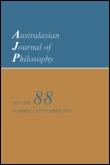
AUSTRALASIAN JOURNAL OF PHILOSOPHY
Navigating the Complexities of Human ThoughtAustralasian Journal of Philosophy, published by Routledge Journals, Taylor & Francis Ltd, serves as a premier platform for scholarly discourse in the field of Philosophy. With its origins dating back to 1947, this esteemed journal maintains a rich tradition of fostering high-quality, peer-reviewed research and is recognized for its significant contribution to the philosophy community. Holding a distinguished Q1 ranking in the field for 2023 and standing at #75 out of 806 in the Scopus Arts and Humanities ranking, it occupies a vital niche in advancing philosophical knowledge and inquiry. Although the journal is not open access, it periodically offers articles that contribute to the dissemination of philosophical thought, making it a valuable resource for researchers, professionals, and students alike. The AUSTRALASIAN JOURNAL OF PHILOSOPHY continues to inspire and challenge thinkers worldwide as it presents critical analyses, innovative ideas, and rigorous arguments, ensuring its relevance and importance in contemporary philosophical discussions.

Journal of Moral Philosophy
Cultivating Insight into Ethical TheoriesThe Journal of Moral Philosophy is a prestigious scholarly publication dedicated to the exploration and analysis of ethical theories and moral frameworks. Published by BRILL in the Netherlands, this journal has established itself as a leading voice in the field, currently holding an impressive Q1 ranking in Philosophy for 2023 and positioned in the 75th percentile among similar publications in the Scopus Arts and Humanities category. Since its inception in 2004 and continuing through 2024, the journal seeks to provide a platform for rigorous philosophical inquiry, featuring original research articles, comprehensive reviews, and critical discussions that foster dialogue among scholars. Despite it not being open access, the journal maintains a strong commitment to advancing philosophical thought and engaging the academic community, making it an essential resource for researchers, professionals, and students aspiring to deepen their understanding of moral philosophy.
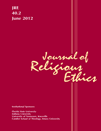
JOURNAL OF RELIGIOUS ETHICS
Contributing to Global Conversations on Religious EthicsJOURNAL OF RELIGIOUS ETHICS is a premier academic journal dedicated to fostering scholarly discourse within the field of religious studies, specifically focusing on moral theory and its implications in various religious contexts. Published by Wiley, the journal showcases rigorous research and theoretical exploration related to ethical dimensions of religion, contributing significantly to the broader understanding of moral philosophy. With an impressive 2023 impact factor placing it in the Q1 category of religious studies and a commendable Scopus rank of 126 out of 644, it is positioned amongst the top-tier journals in its field, reflecting its influence and the high quality of its manuscripts. The journal welcomes diverse perspectives and interdisciplinary approaches, making it an essential resource for researchers, educators, and practitioners seeking to deepen their understanding of the ethical implications of various religious traditions. Serving a global audience from its UK base, the JOURNAL OF RELIGIOUS ETHICS continues to be an indispensable platform for innovative scholarship and dialogue.
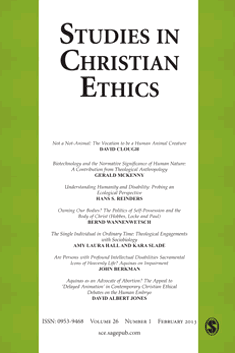
Studies in Christian Ethics
Engaging Scholars in the Dialogue of Christian EthicsStudies in Christian Ethics, published by SAGE Publications Ltd, is a leading academic journal dedicated to the exploration of Christian ethical thought within the broader landscape of philosophy and religious studies. With an ISSN of 0953-9468 and an E-ISSN of 1745-5235, this journal engages scholars and practitioners in critical dialogue surrounding contemporary ethical issues as they relate to Christian teachings and traditions. Located in the United Kingdom, it has steadily positioned itself within Q3 quartiles for both Philosophy and Religious Studies, showcasing its significant influence, as evidenced by its Scopus rankings in these fields. With a focus on publishing high-quality research, it serves as a vital resource for those aiming to deepen their understanding of ethical frameworks and the implications of faith-based decision-making in diverse contexts. While the journal is not open access, it offers robust access options through institutional subscriptions, ensuring that vital scholarship reaches a wide audience of researchers, professionals, and students interested in the intersection of faith and ethics.

LAW AND PHILOSOPHY
Unraveling the Philosophical Threads of LawLaw and Philosophy is a distinguished academic journal published by Springer, focusing on the intersection of legal studies and philosophical inquiry. With an esteemed impact factor reflecting its influence in the field, the journal has achieved notable ranks, placing it in Q2 in Law and Q1 in Philosophy as of 2023. Readers can access it through institutional subscriptions, emphasizing its role in enriching debates around law's philosophical underpinnings. This journal, with its inception in 1982 and continuing through 2024, provides a platform for innovative ideas, fostering dialogue among researchers, professionals, and students. It aims to publish cutting-edge articles that challenge existing doctrines and propose new theoretical frameworks, making it essential for anyone engaged in the critical study of law and its philosophical ramifications.
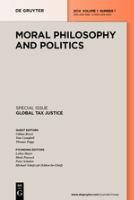
Moral Philosophy and Politics
Exploring the Intersection of Ethics and GovernanceMoral Philosophy and Politics, published by WALTER DE GRUYTER GMBH, stands as a leading journal in the fields of ethical theory, political philosophy, and the social sciences. With an ISSN of 2194-5616 and an e-ISSN of 2194-5624, this journal provides a vital platform for interdisciplinary dialogue surrounding moral issues and political dynamics, particularly emphasizing the integration of historical philosophy with contemporary social issues. As a Q1 journal in both the History and Philosophy of Science and Philosophy categories for 2023, it demonstrates exceptional academic rigor and impact, solidifying its reputation within the academic community. Additionally, it holds significant rankings in Scopus, including #135 in Arts and Humanities (Philosophy) and #45 in Arts and Humanities (History and Philosophy of Science). The journal, which has been converging insights since its establishment in 2014 and will continue through 2024, is crucial for scholars and practitioners alike, enabling them to explore and contribute to the continuing discourse in moral and political thought. While the journal is not open access, it ensures broad dissemination of knowledge through its publication, affirming its importance as a reference point for ongoing research and philosophical inquiry. Located in Berlin, Germany, the journal addresses a global audience eager to engage with pressing ethical and political questions.
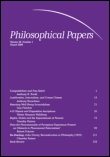
Philosophical Papers
Advancing Philosophical Discourse Since 1972Philosophical Papers, an esteemed journal published by Routledge Journals, Taylor & Francis Ltd, stands as a pivotal resource in the field of philosophy. Having established its presence since 1972, this journal has converged a wealth of intellectual discourse and contributes to the continuous development of philosophical thought until 2024. With a prestigious Q1 category ranking in the arts and humanities, and a notable 86th percentile ranking in Scopus's philosophy category, it underscores its commitment to rigorous scholarship and influential research. Although Open Access options are not currently available, the journal remains a vital platform for philosophers, researchers, and students aiming to engage with pivotal philosophical debates and advancements. Set in the UK, Philosophical Papers exemplifies the intersection of tradition and innovation in philosophical inquiry, making it an indispensable reference for anyone dedicated to exploring the complexities of human thought and existence.
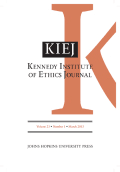
KENNEDY INSTITUTE OF ETHICS JOURNAL
Pioneering Insights at the Intersection of Ethics and Social ScienceThe KENNEDY INSTITUTE OF ETHICS JOURNAL, published by the prestigious Johns Hopkins University Press, stands as a leading periodical in the realm of ethics, particularly emphasizing the intersection of health policy, social sciences, history, and philosophy of science. With an ISSN of 1054-6863 and an E-ISSN of 1086-3249, this journal has been a cornerstone of ethical discourse since its inception in 1991. Renowned for its rigorous peer-review process, the journal boasts impressive rankings, including Q1 in History and Philosophy of Science and Q2 in Health (Social Science) for 2023. Researchers, professionals, and students alike will find this journal invaluable for navigating complex ethical issues, providing a platform for innovative research and discourse. Although currently not offering Open Access, its contributions to the fields of ethics and legal aspects of health are profound, making it an essential resource for those engaged in these critical discussions.